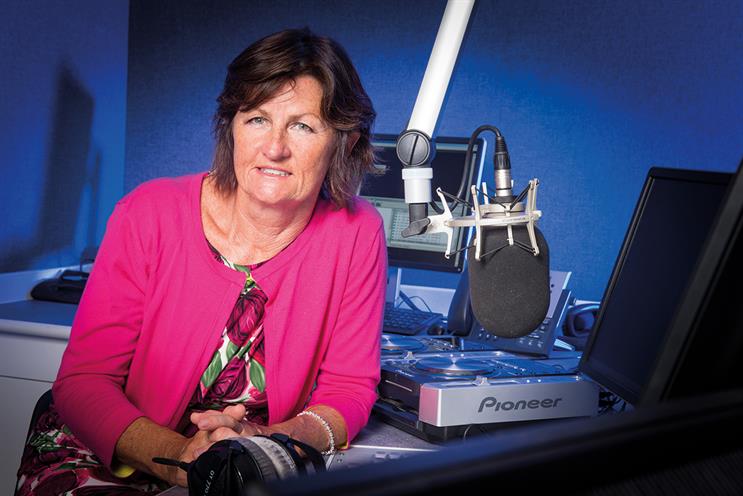
As the Radiocentre chief executive, Siobhan Kenny, stood up at the autocue to address the Bauer Media conference at the London Olympic Park, something kicked in. Out of nowhere, she found herself screaming "Hello Bauer" to the assembled hordes in the manner of a breakfast DJ hosting a "party in the park". Luckily, they cheered. "It was like a pantomime. A right old laugh," she jokes.
Just over a year into her tenure, Kenny has made some big decisions. First is scrapping the 23-year-old Radio Advertising Bureau brand. The expertise will continue – this is no cost-cutting exercise – but it will now be part of Radiocentre (note the lower case "c"), as will Radio Advertising Copy Clearance.
"In the world that we live in, those areas are really coming together," Kenny explains.
Radiocentre worked with the design agency Thinkfarm to develop its new branding. The old red logo is replaced with text in block capitals alongside concentric circles denoting "sound waves" and "broadcasting". The old strapline, "Shaping commercial radio’s future", becomes the succinct but multilayered "Sound, commercial, sense".
Simplifying the organisation and its brand is a bold step but, if Kenny had any concerns, they were allayed when an industry executive recently suggested she should meet Lucy Barrett at the RAB. It was proof that the status quo was confusing – it was Kenny who hired Barrett, a former comms director at J Walter Thompson, as the RAB’s client director with a brief to promote radio ads to advertisers and agencies.
But despite the work Barrett and Clare Bowen, the RAB head of creative, do, Kenny believes more is needed. Radiocentre is going to Brussels.
The terms and conditions that finance, retail and motor brands are obliged to include in radio ads are costing the industry £135 million in wasted airtime per year and they don’t even protect consumers. Kenny wants to free things up.
"We want to work with regulators to say it’s in everyone’s interest to ensure our listeners get quality advice and broadcasting, which applies to advertising as well," Kenny explains. "We don’t want to be putting out bad-quality ads that are incomprehensible."
In fact, Radiocentre research suggests that if people are played ads with long lists of Ts & Cs, they "don’t hear anything". But if brands use simpler ads directing listeners to a website, the messages get across. Kenny says she is optimistic as Jean-Claude Juncker, the European Commission president, is interested in deregulation. But she doesn’t underestimate the complex journey ahead.
Kenny outlined her plans at Radiocentre’s annual conference yesterday. And TBWA\London is working on a campaign to communicate the changes to the wider industry (and public). Over the next few weeks, there will be activity reassuring adland that the "expertise and everything [it] loved about the RAB is alive and kicking". This will be followed later this year by work, also by TBWA, promoting the general benefits of radio.
It’s in everyone’s interest for listeners to get quality advice and broadcasting, which applies to advertising as well
To achieve these changes, Kenny has effectively navigated the politics of commercial radio, and her background in government comms has clearly helped. She was a press officer to both John Major and Tony Blair and the director of communications and strategy at the Department for Culture, Media & Sport under Tessa Jowell for three years.
"Siobhan was one of the best press officers in my time in Downing Street," Alastair Campbell, the former director of communications and strategy for Blair, says. "She is very engaging, very smart and always up for new challenges. It doesn’t surprise me at all that she has ended up in a position of leadership."
While there is a sense that the radio industry is less combative than it has been, the sector certainly backs Kenny. "Siobhan is doing a tremendous job," Stephen Miron, the group chief executive at Global, says. "Under her leadership, the sector has real clarity, vision and purpose."
Dee Ford, the group managing director, radio, at Bauer Media, agrees, saying Kenny has "laid out a strong strategy and rebranding, which we wholeheartedly support".
Given that Kenny chooses to spend her spare time skiing and sailing, it’s no surprise that she has brought a fresh energy to the role. And holding the organisation’s conference at the ping-pong venue Bounce is a statement of intent. With revenues up and income from sectors such as telecoms and retail booming, commercial radio is in a buoyant position.
With her background navigating multiple stakeholders, and ability to keep a crowd interested, Kenny appears to be the woman the radio industry needs. With tech giants such as Apple moving into radio, the sector’s profile is only increasing.
But it will be up to Kenny and the Radiocentre board to ensure that the radio companies can make the most of the opportunities on offer.

